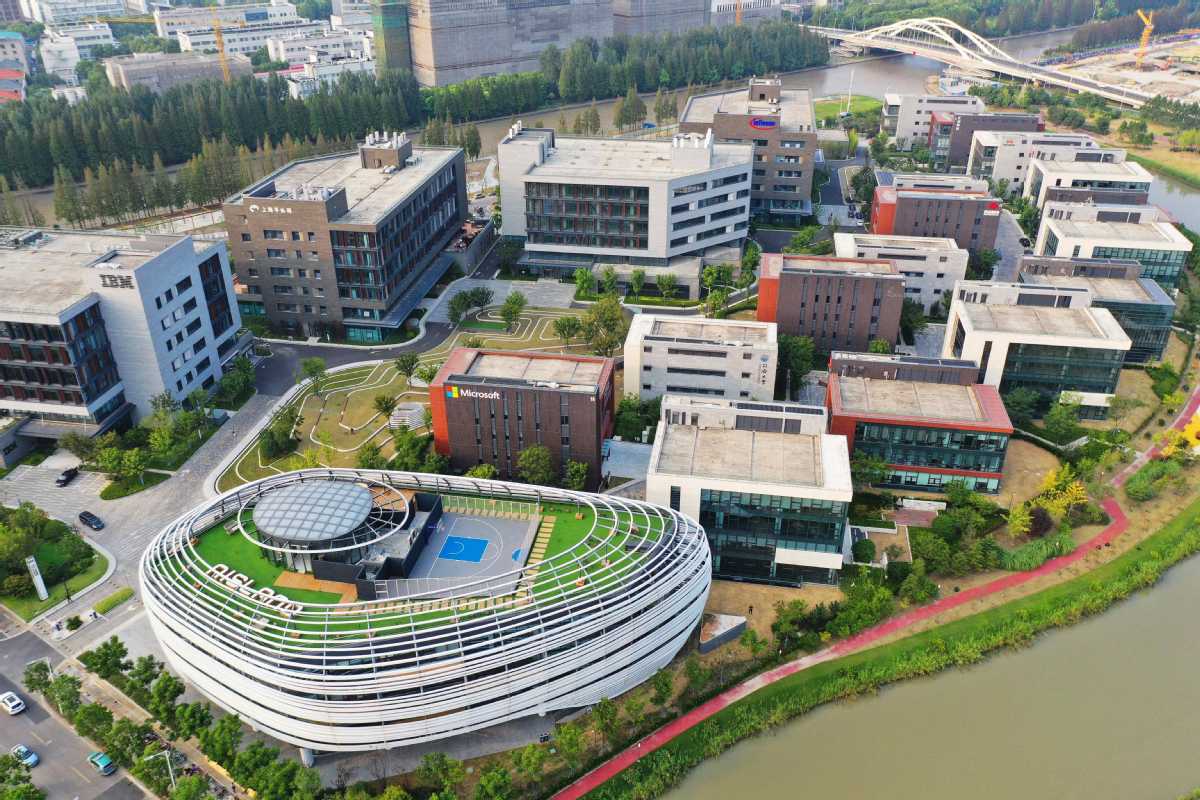AIsland offers tangible solutions to reinvent industries and revolutionize lives
By He Wei in Shanghai | China Daily | Updated: 2019-08-28 10:26

Mobile robots meet and greet you on your way to work, smart streetlights illuminate your way home and unmanned stores allow you to grab a late-night snack - a quick tour of Shanghai's AIsland is like a sneak peak of what city life could look like in the future.
As its name suggests, the 66,000-square-meter AIsland is home to some pretty enterprising undertakings: to turn abstract AI ideas into prototypes, and potentially into tangible solutions to reinvent industries and revolutionize lives.
Construction of the dedicated hub was first proposed in April 2018, just months after the Shanghai municipal government published its goal to build itself into a world-class AI center.
Top-notch enterprises have since flocked in, with the first batch of 20 companies - from big global names like Microsoft and Amazon, to local tech houses such as Alibaba and CloudWalk - on course to set foot in the dedicated zone.
Such developments are heartening news for the city, said Yuan Tao, chairman of Shanghai Zhangjiang Group, the operator of Zhangjiang Science City.
"The profile of these companies, together with a cluster of companies from upstream and downstream sectors, will help AIsland lead the national AI pack and secure Shanghai's position as a budding center for tech innovation," said Yuan.
The AI zone, which is expected to see more than 30 application scenarios, will conduct a number of pilot programs such as smart parking, intelligent lighting, environment monitoring and unmanned convenience stores, said Han Lu, deputy general economist of the Zhangjiang Group.
"The pilot zone should be a prototype mimicking what future cosmopolitan life could look like," Han said, adding that the zone will feature the city's first 5G+AI pilot zone and host more than 8,000 research and development personnel.
Drones and robots are in place to monitor the operation of the zone, conduct last-minute delivery of goods, and even clean the streets on a real-time basis. Han said these are all achieved by algorithms doing the computing, data storage and analysis.
A showroom displays a variety of real-life scenarios using AI. Detectors track students' body movements to gauge their level of attention in classrooms and analyze their performance, providing guidance to teachers on their progress in coursework.
Ideally, routine tasks like score-marking and campus security management can all be performed by algorithms, said Dong Junwu, principal of Shanghai Shixi High School.
"We not only want to include AI-themed courses such as the introduction of voice-controlled drones and robots, but are also looking to use AI-backed systems to raise schools' overall management efficiency, like using data to assess students' command of newly learned knowledge," said Dong, whose school is currently piloting the use of AI to modernize education.
A smart home is also in the making, where electronic appliances are turned on automatically when the occupant returns home, a magic mirror suggests outfits based on the weather forecast, and an intelligent fridge reminds you to buy groceries after checking an inventory.
Microsoft is among the global tech powerhouses riding the waves generated by Shanghai's AI ambitions, bringing to the city some of its most advanced research facilities.
The company's latest move includes the opening of an AI and internet of things lab in May 2019, the third and largest of its kind in the world. The first batch of 30 clients stand to benefit from turning prototyping into products by leveraging Microsoft's AI and IoT solutions, said Lin Miaojing, project director of the Microsoft AI and IoT lab.
Shanghai Jiongling Information Technology is one such startup using Microsoft's cloud computing architecture for city management. The company's deployment of more than 40,000 IoT-enabled objects can send signals to detect suspicious activity and report to police.
"For example, if we detect suspiciously high usage of water and electricity in one apartment using smart electric meter readings, there is a good likelihood of group-renting, and we will report that to the local public security department," said Chen Jihua, the company's innovation business director.
Buoyed in part by the AIsland, the digital economy of Zhangjiang Science City is expected to jump from 200 billion yuan to 300 billion yuan in three years, according to a government directive issued in July.
For years, there was a lingering sense of disappointment in Shanghai technology circles at having missed the opportunity to host top Chinese industry players such as Baidu, Alibaba and Tencent.
But experts see Shanghai's solid industrial foundation, integrated database and well-developed capital market boosting the AI industry.
While internet companies that invest in specific areas can benefit from adopting AI across a number of customer-facing scenarios, the technology can also be better employed to facilitate business-to-business sectors in the region, which is home to numerous small - and medium-sized high-tech enterprises, said Li Zhu, founding partner of venture capital firm Innoangel.
"Shanghai has served an important role in building the country's AI ecosystem since it expressed its ambition to create an industrial cluster for AI. This places Shanghai in a good position to connect upstream and downstream companies," said Zhang Wen, president of AI unicorn SenseTime, which is set to build global centers for research and development, smart cars, chips and education in the city.
























